

9 Tactics for Rapid Learning (That Most People Have Never Heard Of) Whenever the subject of why some people learn faster comes up, I get a whole host of common answers: Some people are just naturally smart.
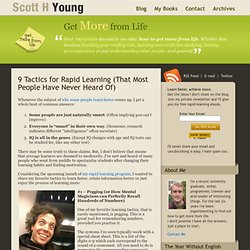
(Often implying you can’t improve)Everyone is “smart” in their own way. (Nonsense, research indicates different “intelligences” often correlate)IQ is all in the genes. (Except IQ changes with age and IQ tests can be studied for, like any other test) Wandering mind not a happy mind. People spend 46.9 percent of their waking hours thinking about something other than what they’re doing, and this mind-wandering typically makes them unhappy.
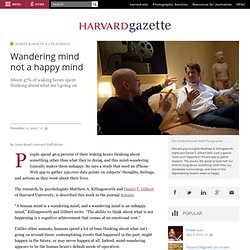
So says a study that used an iPhone Web app to gather 250,000 data points on subjects’ thoughts, feelings, and actions as they went about their lives. The research, by psychologists Matthew A. Killingsworth and Daniel T. Gilbert of Harvard University, is described this week in the journal Science. Mind Mapping & Diagrams. Meme. Telex External Link Internal Link.
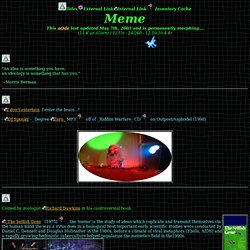
20 Most Influential Scientists Alive Today. Scientists are perhaps the most influential people in the world today. They are responsible not only for the great practical advances in medicine and technology, but they also give us a deep understanding of what the world is and how it works. Their role in shaping the worldview of our culture is unrivaled. Below is SuperScholar’s list of the twenty living scientists that we regard as having most profoundly influenced our world.
World we see is make-believe, top British scientist says. THE human brain creates its own version of reality, and the world we see around us is mostly make-believe, according to a top British scientist.

Professor Bruce Hood will explore the limits of the human mind in a series of prestigious lectures for the Royal Institution of Great Britain, the oldest independent research body in the world, it was announced yesterday. Meditation. Mind & Spirit Vaults. Squareeater - binaural audio and brainwave entrainment for the psychedelic mind. Psych. You're living in a computer simulation, and math proves it. Character (arts) The study of a character requires an analysis of its relations with all of the other characters in the work.[9] The individual status of a character is defined through the network of oppositions (proairetic, pragmatic, linguistic, proxemic) that it forms with the other characters.[10] The relation between characters and the action of the story shifts historically, often miming shifts in society and its ideas about human individuality, self-determination, and the social order.[11] In his book Aspects of the novel, E.
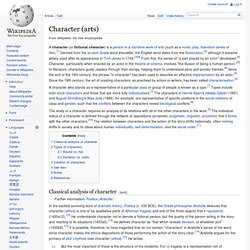
M. Forster defined two basic types of characters, their qualities, functions, and importance for the development of the novel: flat characters and round characters.[24] Flat characters are two-dimensional, in that they are relatively uncomplicated and do not change throughout the course of a work. By contrast, round characters are complex and undergo development, sometimes sufficiently to surprise the reader.[25] Aston, Elaine, and George Savona. 1991. Logic. Imaginary friend. Imaginary friends or imaginary companions are a psychological and social phenomenon where a friendship or other interpersonal relationship takes place in the imagination rather than external physical reality.
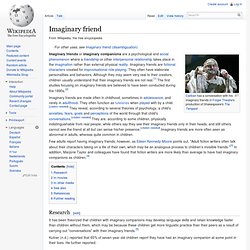
Imaginary friends are fictional characters created for improvisational role-playing. They often have elaborate personalities and behaviors. Although they may seem very real to their creators, children usually understand that their imaginary friends are not real.[1] The first studies focusing on imaginary friends are believed to have been conducted during the 1890s.[2] Few adults report having imaginary friends; however, as Eileen Kennedy-Moore points out, "Adult fiction writers often talk about their characters taking on a life of their own, which may be an analogous process to children’s invisible friends. Research[edit] Paradox of tolerance. The tolerance paradox arises from a problem that a tolerant person might be antagonistic toward intolerance, hence intolerant of it.
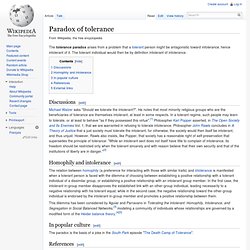
The tolerant individual would then be by definition intolerant of intolerance. Discussions[edit]
Psychology. Hypnosis. Discovering EGO. Application/Hinderance of EGO. Consciousness. Dreams. Clearing the Mind: How the Brain Cuts the Clutter. Newly discovered neurons in the front of the brain act as the bouncers at the doors of the senses, letting in only the most important of the trillions of signals our bodies receive.

Problems with these neurons could be the source of some symptoms of diseases like attention deficit disorder and schizophrenia. List of unsolved problems in philosophy. This is a list of some of the major unsolved problems in philosophy.

Clearly, unsolved philosophical problems exist in the lay sense (e.g. "What is the meaning of life? ", "Where did we come from? ", "What is reality? ", etc.). Aesthetics[edit] PonderAbout.com. Zeno's "Paradox of the Arrow" passage from Biocentrismby Robert Lanza M.D.Related Posts:The Paradox Of The Infinite CircleThe Liar ParadoxThe Barber Paradox Tags: paradoxes Posted in Time Comments It's just an exercise in logic by an ancient philosopher.
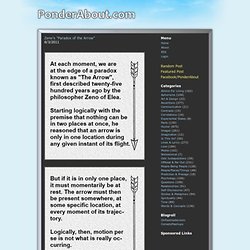
Object moved. A growing body of literature shows that one’s working memory (WM) capacity can be expanded through targeted training. Given the established relationship between WM and higher cognition, these successful training studies have led to speculation that WM training may yield broad cognitive benefits. This review considers the current state of the emerging WM training literature, and details both its successes and limitations. We identify two distinct approaches to WM training, strategy training and core training, and highlight both the theoretical and practical motivations that guide each approach. Training-related increases in WM capacity have been successfully demonstrated across a wide range of subject populations, but different training techniques seem to produce differential impacts upon the broader landscape of cognitive abilities.
Consciousness. Consciousness We exist in a matrix, simulation, hologram, or virtual programmed reality that we believe is real because our brains tell us it is. Consciousness is all and everything in the virtual hologram of our experiences brought into awareness by the brain - an electrochemical machine forever viewing streaming codes for experience and interpretation. Consciousness originates from a source of light energy for the purpose of learning. Do We Really Only Use 10 Percent of Our Brains? The brain is an amazing thing. Our brains help us learn, create, and imagine, and often it seems that there's almost nothing that our magical three pounds of neurons can't do.
'Twin Babies Having a Conversation' Video Shows How We Learn to Communicate. A Youtube video showing two 17-month-old twins chatting and laughing with one another has gone viral in the past two days, with many blogs speculating on what the babies might be discussing. A report on ABC News suggested they're speaking a "secret twin language" all their own. But have these twins really created their own secret language from nothing? [See the video] One language development expert says no. Like most twins who communicate what appears to be high-level language, they're not actually speaking a private language of their own creation.
"These two adorable 17-month-olds show in an exaggerated way something that most children show, but usually not nearly so developed," said Virginia Valian, the head of the Language Acquisition Research Center at Hunter College in New York. But the brothers aren't conveying actual information through a secret language. Out-of-the-box thoughts. Ideas, issues, concepts, subjects - v.
Top 10 Strange Phenomena of the Mind. Humans. Multimodal Ganzfeld Gives Mild Hallucinations ? Mind Modifications ? Archives. Your Amazing Brain. Basics - Abstract Thoughts Prompt Literal Physical Responses. Free Will. It's been a while since I blogged about Free Will. Current thought allows us to understand that reality is created by consciousness therefore we all have free will to change our lives and destinies. Free will is an illusion, biologist says. Consciousness.